

October 11th marks International Day of the Girl, providing us with an opportunity to shed light on the critical importance of addressing gender inequalities in efforts to protect children's rights.
Our endeavours and commitments centre on safeguarding and advocating for children's rights, particularly those of children in street situations. To effectively respond to diverse situations they face, it is imperative to consider the dynamics that disproportionately impact young girls. Indeed, beyond the numerous instances of violence and discrimination experienced by children in street situations, young girls face additional specific challenges.
Life on the streets exposes children to a multitude of dangers. However, for young girls, the troubling reality is that rape and sexual violence are the most severe and pressing issues to confront. As one young Malagasy girl expressed, "These are the problems that exist here on the streets, and nearly all the girls here are victims." Accounts collected by our partners in Madagascar reveal that while young boys are not immune to sexual assaults, the majority of victims are underage girls. On the streets, young girls are also particularly vulnerable to prostitution in extreme conditions of poverty, where survival is paramount.
The repercussions of such events on young women are deeply concerning in every respect, whether from a physical, psychological, or social perspective. These assaults not only have serious implications for their development, such as the risk of infections and trauma, but also contribute to social reproduction and impoverishment due to the threat of unwanted pregnancies. It is evident that these young girls already struggle to meet their own needs, and the responsibility of caring for a child only intensifies their vulnerability.
Given these alarming observations, it is crucial to implement strategies and tailored solutions on the ground to support these young girls. In the Congo, one notable example is the organization Actions de Solidarité Internationale (ASI), which is a member of the REIPER network. ASI is dedicated to upholding the rights of young girls in street situations. ASI specializes in providing comprehensive support to vulnerable young girls, encompassing medical, psychological, social, educational, and vocational assistance. Several times a week, a team of educators and nurses reaches out to young girls on the streets and guides them to a day-care centre, where they receive support from the educational team.
Now, more than ever, it is imperative for governments to stand in solidarity with girls in street situations, ensuring their access to rights and protecting them from all forms of violence.
